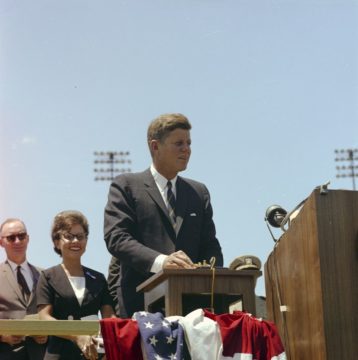But this Nation was not founded solely on the principle of citizens’ rights. Equally important, though too often not discussed, is the citizen’s responsibility. For our privileges can be no greater than our obligations. —John F. Kennedy, May 18, 1963, Nashville

May, 1963. JFK is in a centrifuge, buffeted by a series of challenges from abroad and at home that would have taxed anyone. Underneath the glamour and optimism of Camelot was a roiling mess of seemingly intractable problems, including the global threat of an aggressive, expansive Communism, and domestic unrest related to the irrefutable moral logic of the Civil Rights Movement set against implacable, and often violent, resistance.
All of this, the triumphs and the troubles, are, for the first time, playing out in black and white (and occasionally in living color) on television screens across America. We have clearly moved into a “see it now” age: in just the decade of the 1950s, the percentage of households with sets went from about 9% to about 87%. Soft censorship (reporter circumspection and editorial oversight) still existed, but the vast majority of people were getting their news visually, and sometimes that news contained graphic and unforgettable images.
Kennedy clearly understood the power of the new medium. He wrote a short essay for TV Guide in November 1959, in which he discussed his concerns about television’s potential for demagoguery, but also said it gave an opportunity to the viewing public to judge for itself a candidate’s sincerity—or lack of it. If that was a prediction, it was a pretty good one: Ten months later, in what was a decisive moment in the 1960 election, he was debating Richard Nixon, and winning, in part, on style points. Read more »
